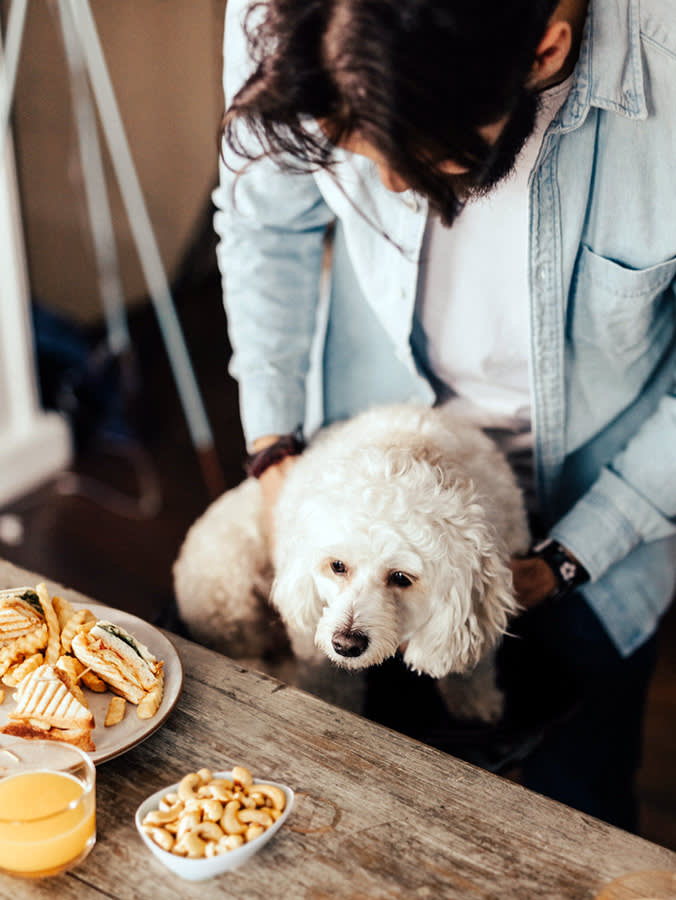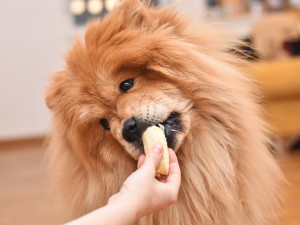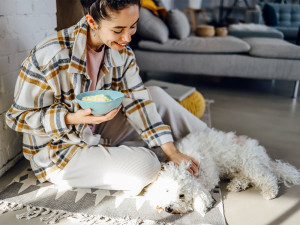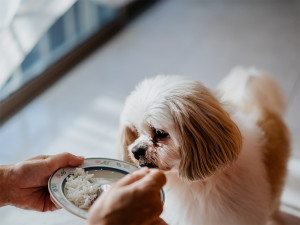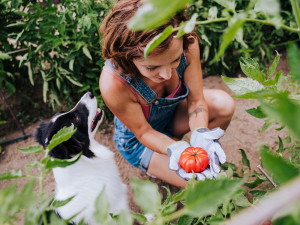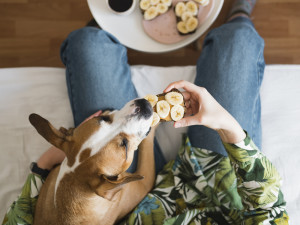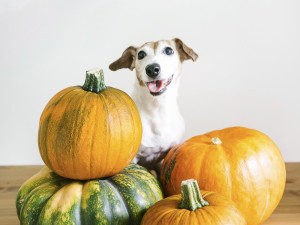Cashews may be small, but they pack a nutritional punch and are incredibly versatile. Maybe you love cashews for snacking, with all kinds of delicious flavors and spices added, or maybe you’re looking for dairy-free alternatives and have discovered cashew milk, cashew-based yogurt, and/or cashew cheeses.
Whatever form of cashew you’re enjoying, you might be wondering if you can share them with your dog. The answer is that yes, in small amounts, plain cashews are safe for dogs — but there are a few important points to keep in mind. Read on to learn all about sharing cashews with your pup.
Nutrition facts about cashews for dogs
Cashews are typically considered to be nuts; however, the truth is a bit more unusual. Cashews are actually a fruit from the Anacardium occidentale tree. This family also includes mangoes, poison ivy, and poison oak. The cashew tree is native to tropical climates, such as that in Brazil.
A cashew apple, considered an edible accessory fruit, grows on the tree and is sometimes used to make juices and jams. Then, the main fruit, the cashew, grows within a double shell that must be roasted and carefully removed to reveal the cashew.
How much do you spend on your pet per year?
Cashews are often roasted and flavored in numerous ways including with salt, chilis, and other seasonings. They are considered to be a healthy snack food; they contain lots of protein, healthy fats, and important vitamins and minerals.
Are cashews good for dogs?
Cashews can provide some healthy nutrients to dogs; however, they should only be offered in small amounts. Some nutritional benefits of cashews include:
Protein: Cashews are a high-protein food, and protein is an important source of amino acids. Protein is also a good source of long-lasting energy. Dogs have specific protein requirements, because this is such a critical nutrient, and all commercial dogs foods must contain a minimum amount of protein to meet their needs. High-protein snacks are a good bonus.
Fat: Cashews are also high in fat, which helps them have an appealing taste and also provides long-lasting energy and feelings of fullness. Cashews contain both unsaturated and saturated fats.
Vitamins: Cashews also contain important vitamins including vitamin K, vitamin A, and B vitamins like thiamin, folate, and B6, all of which are critical to normal biological functions.
Minerals: Cashews provide iron, copper, magnesium, phosphorus, and manganese, too. These minerals play important roles in the body by supporting heart health, muscle contractions, nerve function, bone health, and a strong immune system.
Fiber: Cashews contain both soluble and insoluble fiber. These carbohydrates are important in digestive health to prevent constipation and provide nutrients to the gut microbiome.
Can dogs eat cashews with the shell?
The outer shell of the cashew contains a toxin called that is very irritating to the skin and can cause a painful rash. This same toxin is found in other plants of the Anacardium family including mango trees, poison ivy, and poison oak.
The good news is that commercially sold cashews never have a shell for this reason; the toxin is also irritating to human skin. However, if you have a cashew tree on your property, be sure to keep your dog away from it because chewing on the outer shells of the cashews can cause a painful rash.
Are cashews completely safe for dogs?
Cashews are not completely safe for dogs; there are a few important considerations to keep in mind before sharing them:
High-fat content: Cashews are high in fat. While fat is an important nutrient for dogs and can be a great source of energy, some dogs are sensitive to high-fat foods and may develop digestive upset including vomiting or diarrhea from eating fatty foods. It can also put dogs at risk for more serious pancreatitis.
Even if your dog tolerates it well, keep in mind that lots of high-fat snacks will increase their overall caloric intake and put them at risk for weight gain and related health problems, so high-fat snacks should be avoided.Beware of salt and other added seasoning: Many times, cashews are sold with a lot of added salt and/or other added seasonings like chili powder, citrus seasoning, added sugar, and more.
Avoid high-salt and high-sugar snacks as these are not healthy for dogs, and be sure to check that there are no toxic ingredients like garlic powder or onion powder in the mix, too. It is best to stick to plain, roasted cashews with no seasoning at all if you plan to share any with your pup.Urushiol toxicity: This is a toxin found in the shell of the cashew and other parts of the tree that can cause irritation and blistering of the skin. It is the same toxin found in mango trees, poison ivy and poison oak.
Cashews sold commercially do not contain any urushiol; however, cashews cannot be eaten straight from the tree. This is only a concern if you have access to a cashew tree, in which case, be sure to keep your dog away from the tree and any fallen fruits.
The bottom line: Can dogs eat human food?
There are lots of human foods that are safe and healthy for dogs to eat. It is very important to do your research to be sure that foods you want to share are non-toxic and healthy for your dog to snack on. In all cases, dogs should mostly eat a complete and balanced dog food diet to ensure they meet all of their nutritional needs and are not at risk for any deficiencies.
This means that snacks should be kept to a minimum so that they don’t fill up on non-essential foods. Ideally, treats and table snacks should be less than ten percent of your dog’s total intake. This also ensures that you don’t accidentally overfeed your pup, putting them at risk for weight gain and associated health problems like arthritis and diabetes.
Some dogs may be more sensitive than others to novel foods, so be sure to start slow and with just a small bite-sized amount to see how your dog tolerates a new food. If they develop any unusual signs like vomiting, diarrhea, or hives, be sure to contact your veterinarian right away and avoid those foods in the future.
Other foods that are safe for dogs
Shrimp can be safe so long as you follow a few guidelines.
Apples can be a crunchy and healthy snack, too.
Peanut butter is often a pup favorite; just be sure to check the ingredients.
Other foods that are dangerous
Pecans are toxic and should not be shared with dogs.
Garlic, onions, and these other toxins should also be completely avoided.
Foods containing the artificial sweetener, xylitol, are also toxic.
FAQs (People also ask)
How many cashews can a dog eat?
Dogs should not eat large amounts of cashews as they are high in fat. A small bite is OK if they tolerate it without digestive upset.
Is it OK to give dogs cashews?
Cashews are high in fat and may cause digestive upset and/or pancreatitis. It’s best to avoid feeding them to dogs.
Why do dogs like cashews?
Dogs may like the flavor because they are high in fat and protein.
Can dogs eat cashews?
Cashews are non-toxic; however, the high-fat content means they are not a good choice for dogs.
Are cashews good for dogs?
No, they are not good for dogs to eat often; however, they are non-toxic.
Can dogs eat all parts of the cashew?
The outer shell of the cashew contains a toxin that causes a painful rash, so they should not be permitted to eat or come in contact with these parts of the cashew.
Are cashews safe for dogs?
The cashew nut is nontoxic but is high in fat, which may be unhealthy for many dogs.
